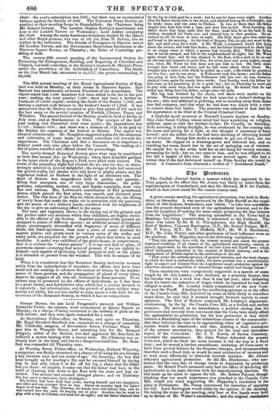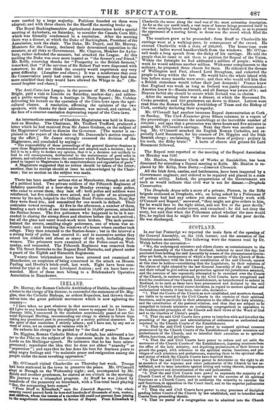Zbe Vrobtntes.
The Carlisle Journal denies a rumour which has appeared in the Tory papers, to the effect that Mr. James was likely to retire from the representation of Cumberland, and that Mr. Howard, M.P. for Carlisle, would in that event stand for the vacant county-seat.
A great county meeting, for agricultural protection, was held in Berk- shire, on Saturday. It was convened by the High Sheriff on the requi- sition of 800 farmers, freeholders, and others, " to take into considera- tion the present depressed state of the agricultural interest, and to dis- cuss the propriety of seeking for more ample protection for that interest from the Legislature." The meeting assembled in the Town-hall at Reading; but being overcrowded, it adjourned to the Forbury. The chair was taken by Sir R. G. Throgmorton, the High Sheriff: the Earl of Radnor, Viscount Barrington, M.P., Mr. Robert Palmer, M.P., Mr. P. Pusey, M.P., Mr. T. Duffield, M.P., Mr. W. S. Blackstone, M.P., Mr. John Walter, and other gentlemen of local influence were on the platform. Mr. Hippesley moved the following resolutions- " That this meeting views with the utmost anxiety and alarm the present depressed condition of all classes of the agricultural community, caused, or greatly aggravated, by the operation of the new Corn and Tariff laws ; which afford inadequate protection to the exercise of British industry, and to the employment of British capital in the cultivation of the soil.
" That under the extreme pressure of general taxation, and the local charges to which the land is exclusively liable, the home produce has a constitutional right to expect and demand from the Legislature ample protection against the otherwise ruinous competition of untaxed foreign capital and foreign labour."
These resolutions were energetically supported in a speech of some length by Mr. Job Lousley ; who declared, as a practical farmer, that his income was 101. a week less than it was last year, after deducting from his losses the reduction of wages which he regretted he had been obliged to make. Mr. Lousley loudly complained of the new Corn- law and the Tariff. Alluding to the conflicting opinions as to the effect of the Canada Corn Bill, described by some as little likely to introduce much flour, he said that it seemed brought forward merely to cause agitation. The Earl of Radnor combated Mr. Lousley's arguments; condemning, by the by, the Canada Corn Bill, as a foolish and useless measure. He moved, as an amendment, a petition stating that the petitioners had recently been convinced that the Corn-laws really afford the agriculturist no protection, but his best protection is that which induces a flourishing state of the industrious classes of the community; that they believed the time to be approaching when all legislative pro- tection would be abandoned ; and that, desiring a final; settlement of the present uncertainty, they prayed for the total and immediate repeal of the Corn-laws. Mr. J. T. Norris, of Sutton Courtney, seconded the amendment. Mr. John Walter defended the present Corn-law, which he liked the more because it led the way to a fixed duty ; and he moved a further amendment, declaring all Corn-laws to have been proved failures by the frequent changes, and recommending therefore such a fixed duty as would be most productive of revenue and so tend most effectually to diminish internal taxation. Mr. Allnatt defended agricultural protection. So did Mr. Blackstone; who con- tended that the very fact of change tends to depression by producing panic. Sir Robert Peel's measures only had the effect of involving the agriculturist in the same distress with the manufacturing districts. lie had made up his mind to oppose the bill. Mr. Robert Palmer, though thinking that too much importance was attached to the Canada Corn Bill, would not mind supporting Mr. Hippesley's resolution in his place in Parliament. Mr. Pusey announced his intention of opposing the bill. Lord Barrington would abide by the opinion of the meeting. On taking the sense of the meeting, only four or five hands were held up in favour of Mr. Walter's amendment; and the original resolutions
were carried by a large majority. Petitions founded on them were adopted; and with three cheers for the Sheriff the meeting broke up.
The Royal Buckinghamshire Agricultural Association held a special meeting at Aylesbury, on Saturday, to consider the Canada Corn Bill ; which was formally condemned in a resolution. After the meeting there was a dinner, at which the Duke of Buckingham, President of the Association, took the chair. The Duke, Mr. Dupre, and Mr. Murray, Members for the County, declared their determined opposition to the measure, at all risks to Government. Mr. Clayton, Member for Ayles- bury, rather defended the measure, but attacked the League. At this meeting the Duke was once more toasted as " the farmer's real friend." .Mr. Rolfe, returning thanks for " Prosperity to the British farmers," remarked, that " if the services of Sir Robert Peel were dispensed with tomorrow, he did not think the country would experience any very great difficulty. (Laughter and cheers.) It was a misfortune that ever the Conservative party had come into power, because they had done more mischief than they would have allowed the Whigs to do." (Re- newed laughter and cheers.)
The Anti-Corn-law League, in the persons of Mr. Cobden and Mr. Bright, paid a visit to Lincoln on Saturday, market-day ; and addres- sed a public meeting from a hustings in Sheep Square ; Mr. Cobden delivering his lecture on the operation of the Corn-laws upon the agri- cultural classes. A resolution, affirming the opinions of the two speakers, with thanks for their addresses, was moved, and carried, in the face of a counter-resolution deprecating repeal of the Corn-laws.
An intermediate sessions of Cheshire Magistrates was held in limits- ford on Monday. The Chairman, Mr. Trafford Trafford, produced a letter which he had received from Sir James Graham, on the subject of the Magistrates' refusal to dismiss the Governor. [The matter is ex- plained in the report of the debate on Mr. Duncombe's motion respect- ing the affair.] Sir James strongly censured the decision of the Magistrates, and concluded by saying- " The responsibility of these proceedings of the general Quarter-Sessions is upon those Magistrates who recommended and adopted such a decision; but I feel it to be a duty to declare my opinion, that it is a decision not unlikely to lead to evil consequences, detrimental to the maintenance ofgood order in prisons, and calculated to lessen the confidence which Parliament has been dis• posed to impart to Magistrates in the superintendence and regulation of gaols." A Magistrate suggested that no notice should be taken of the letter ; another, that its receipt should at least be acknowledged by the Chair- man ; but no motion on the subject was made.
There has been another serious riot at Manchester, though not at all of a political kind. Two private soldiers of the Fifteenth Regiment of Infantry quarrelled at a beer-shop on Monday evening : some police, who came to arrest them, they beat off: both police and soldiers were reinforced, but five soldiers were seized, and in spite of an attempted rescue by the mob, lodged in the Oldham Road Police-station. Next day they were fined 20s., and committed for one month in default. Their comrades vowed revenge. At five in the afternoon, a number of them, heading a mob which at one time amounted to 10,000 persons, attacked the Station-house. The five policemen who happened to be in it suc- ceeded in closing the strong doors and shutters before the mob arrived ; but all the glass and outer wood-work were broken. The mob peram- bulated the streets, assailing single policemen, one of whom was se- riously hurt ; and breaking the windows of a house where another took refuge. They then returned to the Station-house ; but in the interval a a strong body of police had entered it ; and in successive sorties they seized ten soldiers and about as many of the mob, including three women. The prisoners were examined at the Police-court on Wed- nesday, and remanded. The Fifteenth Regiment was removed from the Tib Street Barracks to the Regent Road Barracks, and placed under a guard of the Eighth and Sixteenth Regiments.
Twenty-three brickmakers have been arrested and examined at Manchester, on suspicion of being concerned in the attack on Messrs. Panling and Henfry's brick-croft, last week. Eight have been com- mitted for trial at the next Liverpool Assizes ; and six have been re- manded. Most of these men belong to a Brickmaker's Operative Association in Manchester.



























 Previous page
Previous page